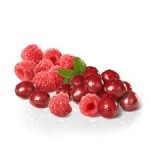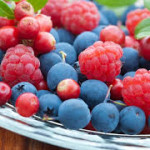 Women have long known that drinking cranberry juice can help reduce the number of urinary tract infections they suffer. Now researchers understand that it is because what is excreted through the urine will keep bacteria from sticking to the bladder wall. While most of these studies have been small there have been a significant number of case studies which indicate that women do reap the benefits. If you suffer from frequent urinary tract infections drinking 8 ounces a day of cranberry juice may be worth a trial run.
Women have long known that drinking cranberry juice can help reduce the number of urinary tract infections they suffer. Now researchers understand that it is because what is excreted through the urine will keep bacteria from sticking to the bladder wall. While most of these studies have been small there have been a significant number of case studies which indicate that women do reap the benefits. If you suffer from frequent urinary tract infections drinking 8 ounces a day of cranberry juice may be worth a trial run.
The second best berry is the raspberry. In a recent study, researchers found that consumers ranked raspberries at number two on their list of favorites, second only to strawberries. Other fruits including bananas, apples and watermelon all trailed behind the raspberry in this study of over 1500 consumers who ranked 13 different fruits in order of preference.
The respondents in the survey were also familiar with many different forms of raspberries. They appeared to enjoy the convenience, consistent quality and the value of individually quickly frozen raspberries as opposed to other types of berries.
Raspberries rank in the top five of the antioxidant high fruits. They are also high in ellagic acid which is believed to slow the growth of certain types of cancer cells. One serving of raspberries has only 70 calories but it actually can provide 50% of a days requirement for Vitamin C, 32% of a days requirement for fiber and 4% of a days requirement for calcium, niacin and zinc. (4)
Raspberries are popular in restaurants and appear on the menus of the top 200 restaurant chains and top 100 independent white tablecloth restaurants.
References:
(1) American Chemical Society: Holiday Fruit Ranks Number One in Antioxidants
http://www.sciencedaily.com/releases/2001/11/011108064027.htm
(2) Journal of Agricultural and Food Chemistry: Resveratrol, Pterostilbene and Piceatannol in Vaccinium Berries
http://phoenix.nal.usda.gov/bitstream/10113/2379/1/IND43638994.pdf
(3) Tufts Journal: A Different Cocktail for the Heart
http://tuftsjournal.tufts.edu/2008/03/briefs/01/
(4) Nutrition Research: Red raspberries have antioxidant effects that play a minor role in the killing of stomach and colon cancer cells
http://www.ncbi.nlm.nih.gov/pubmed/21130297
Resources:
Journal of Agricultural and Food Chemistry: Antioxidant activity in fruits and leaves of blackberry, raspberry, and strawberry varies with cultivar and developmental stage
http://www.ncbi.nlm.nih.gov/pubmed/10691606
Journal of Agricultural and Food Chemistry: Antioxidant and antiproliferative activities of raspberries
http://www.ncbi.nlm.nih.gov/pubmed/11982421
American Society for Horticultural Science: Antioxidants in Midwestern Black Raspberries Influenced by Where They Grow
http://www.sciencedaily.com/releases/2009/02/090226160753.htm
The Cranberry Institute: The Health Benefits of Cranberries and Cranberry Products
http://www.cranberryinstitute.org/news/PR/PR062001.htm
| Advertisement | |
 |
|


Leave a Reply